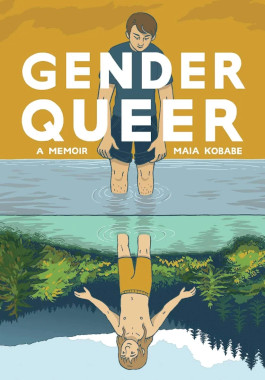Summary | Excerpt | Reviews | Beyond the Book | Read-Alikes | Genres & Themes | Author Bio

Our Fight for Readers' Rights
by Ashley Hope PérezThis article relates to Banned Together
 When speaking about book bans, it rarely takes long for the 2019 graphic memoir Gender Queer to enter the conversation. Its author Maia Kobabe, who is also the first contributing author to Banned Together, never imagined that writing a memoir about eir experience growing up and coming out as nonbinary and asexual would lead to national celebrity as one of the most banned authors in the country.
When speaking about book bans, it rarely takes long for the 2019 graphic memoir Gender Queer to enter the conversation. Its author Maia Kobabe, who is also the first contributing author to Banned Together, never imagined that writing a memoir about eir experience growing up and coming out as nonbinary and asexual would lead to national celebrity as one of the most banned authors in the country.
Kobabe, who uses Spivak pronouns (e/eir/em), was writing the book for emself as much as for the many other people in the world struggling to find their own identities. "There wasn't this language for it," Kobabe said in a 2022 New York Times interview. "I just thought, I am wanting to come out as nonbinary, and I am struggling with how to bring this up in conversation with people. And even when I am able to start a conversation about it, I feel like I am never fully able to get my point across."
It is perhaps the ultimate irony that a book that only had a 5,000-copy run found national fame and readership after its banning began. Its first run did sell out and Kobabe received two separate awards from the American Library Association, but it was a viral video of a parent railing against the book at a school board meeting in 2021 that thrust Kobabe onto the national stage.
Gender Queer would go on to be the subject of multiple lawsuits and the prime example used by hate groups like "Moms for Liberty" in their crusade to keep anything they deem objectionable off of library and bookstore shelves. PEN America and the American Library Association have listed it as the most banned and challenged book in the country for multiple years. Kobabe had been encouraged by fellow writers to try to see challenges and banning attempts as positive in a certain light. "I am trying… to take all of this as, if not a compliment, at least a kind of testament to the strength of my work," e says, and notes that there is a certain honor in finding eir book on shelves alongside authors like Maya Angelou and Harper Lee.
Kobabe has become a passionate, if somewhat exhausted, advocate for the right to read and for the need to support all stories, not just the ones people are comfortable with. "When you remove those books from the shelf or you challenge them publicly in a community, what you're saying to any young person who identified with that narrative is, 'We don't want your story here'," e told the New York Times.
In eir graphic opening to Banned Together, Kobabe balances disturbing facts about book banning, like librarian firings and restricted access to ebook platforms such as Libby, with a celebration of the readers, booksellers, and librarians who have supported em on the unexpected journey to being a leader in the battle against banning. E expresses deep gratitude to everyone who has worked to keep eir book on shelves and urges readers to express their thanks as well: "Make sure they feel the love stronger than the hate," e writes. It's an excellent reminder that book banning damages many more than just the authors of the books and that everyone affected needs our support.
Filed under Books and Authors
![]() This article relates to Banned Together.
It first ran in the March 26, 2025
issue of BookBrowse Recommends.
This article relates to Banned Together.
It first ran in the March 26, 2025
issue of BookBrowse Recommends.
The low brow and the high brow
Click Here to find out who said this, as well as discovering other famous literary quotes!
Your guide toexceptional books
BookBrowse seeks out and recommends the best in contemporary fiction and nonfiction—books that not only engage and entertain but also deepen our understanding of ourselves and the world around us.